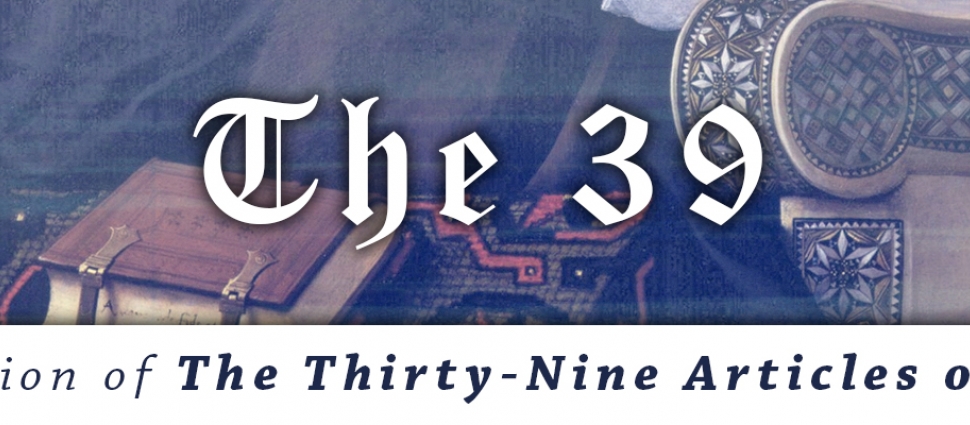39 Articles—Intro

Being a Reformed pastor among Reformed pastors, and being Anglican, has its good-humored moments. At some point in the discussion, you need to address the relationship between our respective confessions, the Westminster Confession and the Thirty-Nine Articles of Religion. Depending on the person, I will gently point out that the WCF was to serve the Church of England, or that if you are English-speaking in ancestry, you were Anglican once. It can bring a smile or a scramble to claim Scots, French, German, or Dutch ancestry instead!
Our year long study of the Sermons of the Great Ejection demonstrated the old taxonomy of Anglican v. Puritan must be consigned to the dustbin of history. The number of conscientious Anglican Puritans who did conform to the 1662 Act of Uniformity suggests that the issue of the Ejection was not an issue of Anglican Reformation theology, but of Anglican Church polity.
Central to any consideration of the difference between the theology and polity between the English Reformed must be the relationship of the Westminster Assembly and the Thirty-Nine Articles of Religion. The defense of the Articles, the Assembly’s commission by Parliament, was suddenly changed on Thursday, 11 October 1643. Provoked by the arrival of the Scottish Commissioners who, as the price for Scottish support against the king, insisted on the signing of the Solemn League and Covenant, with its call for the uniformity of church polity. Because the work of revision was never completed, some have assumed that the work was of no consequence. Far from establishing nothing, the Thirty-Nine Articles provided the understanding of the central doctrines of the Reformation and offer a clear understanding of the Reformed nature of those articles. The Thirty-Nine Articles, arising ninety years earlier among the most enduring statements of the Reformation, is like them the product of a brilliant theological mind, Thomas Cranmer.
The Thirty-Nine Articles are strongly reformed in nature and form part of the threefold collection of historical formularies (1552/1662 Book of Common Prayer which included The Ordinal) subscribed by godly Anglicans around the world. In explaining the call made to all biblically faithful Anglicans in the Jerusalem Declaration of the Global Anglican Future Conference, Chair Nicholas Okoh writes,
Authentic Anglicanism is a particular expression of Christian corporate life which seeks to honor the Lord Jesus Christ by nurturing faith, and also encouraging obedience to the teaching of God’s written word, meaning the canonical Scriptures of the Old and New Testaments. It embraces the Thirty-nine Articles of Religion (published in the year 1571) and the Book of Common Prayer (the two versions of 1552 and 1662), both texts being read according to their plain and historical sense, and being accepted as faithful expressions of the teaching of Scripture, which provides the standard for Anglican theology and practice (The Way, the Truth and the Life: Theological Resources for a Pilgrimage to a Global Anglican Future, p. 18).
The Thirty-Nine Articles should always be included with the Three Forms of Unity and the Westminster Standards.
Thomas Watson's description of the believer's preparation to receive the Lord's Supper was an adaptation of the various "Exhortations" of preparation in the 1552/1662 Book of Common Prayer. John Owen was to write later, “I embrace the doctrine of the Church of England, as declared in the Thirty-nine Articles, and other approved public writings of the most famous bishops and other divines thereof” (Works, 14:196). Every Puritan before 11 October 1643 had learned The Thirty-Nine Articles, kept orders of worship by means of Cranmer’s 1552 Book of Common Prayer, and had been examined in its Catechism.
To understand English Reformed Puritanism is to understand the Thirty-Nine Articles of Religion.
Articles in This Series:
- Introduction
- One God in Trinity, Trinity in Unity (Art. 1)
- The Incarnation and Atonement (Art. 2)
- The Work of Christ (Arts. 3-4)
- The Holy Spirit (Art. 5)
- The Rule of Faith: Part 1 (Art. 6)
- The Rule of Faith: Part 2 (Art. 7)
- The Rule of Faith: Part 3 (Art. 8)
- Guilt, Grace, and Gratitude: Part 1 (Art. 9)
- Guilt, Grace, and Gratitude: Part 2 (Art. 10)
- Guilt, Grace, and Gratitude: Part 3 (Art. 11)
- Guilt, Grace, and Gratitude: Part 4 (Art. 12)
- Guilt, Grace, and Gratitude: Part 5 (Arts. 13-14)
- Guilt, Grace, and Gratitude: Part 6 (Art. 15)
- Guilt, Grace, and Gratitude: Part 7 (Art. 16)
- Grace Alone! (Art. 17)
- Christ Alone! (Art. 18)
- The Visible and Invisible Church: Part 1 (Art. 19)
- The Visible and Invisible Church: Part 2 (Art. 20)
- The Visible and Invisible Church: Part 3 (Art. 21)
- The Visible and Invisible Church: Part 4 (Art. 22)
- The Visible and Invisible Church: Part 5 (Art. 23)
- The Visible and Invisible Church: Part 6 (Art. 24)
- The Sacraments: Part 1 (Art. 25)
- The Sacraments: Part 2 (Art. 26)
- The Sacraments: Part 3 (Art. 27)
- The Sacraments: Part 4 (Art. 28)
- The Sacraments: Part 5 (Art. 29)
- The Sacraments: Part 6 (Art. 30)
- The Sacraments: Part 7 (Art. 31)
- Church Discipline (1)
- Church Discipline (2)
- Church Discipline (3)
- Church Discipline (4)
- Church Discipline (5)
- Church and State
- Christian Property
- A Christian Man's Oath
Henry Jansma (@HenryJansma) is rector of All Souls Anglican Church in Cherry Hill, New Jersey, and canon theologian for the Missionary Diocese of the Convocation of Anglicans in North America East.





